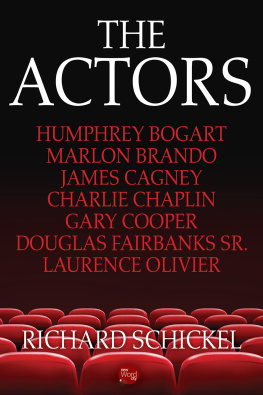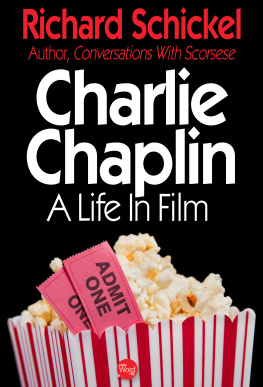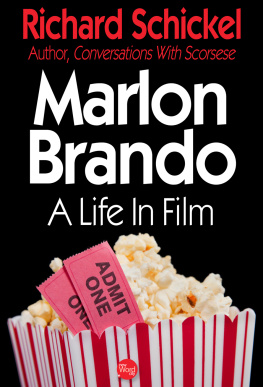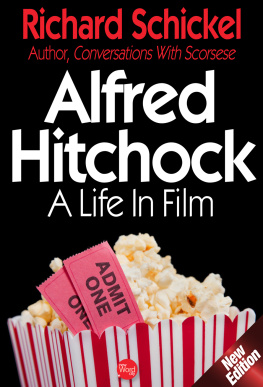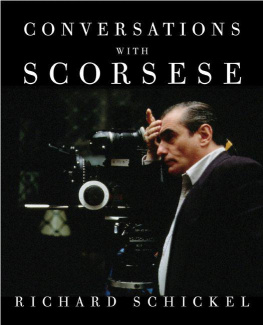Schickel - The Men who Made the Movies
Here you can read online Schickel - The Men who Made the Movies full text of the book (entire story) in english for free. Download pdf and epub, get meaning, cover and reviews about this ebook. genre: Detective and thriller. Description of the work, (preface) as well as reviews are available. Best literature library LitArk.com created for fans of good reading and offers a wide selection of genres:
Romance novel
Science fiction
Adventure
Detective
Science
History
Home and family
Prose
Art
Politics
Computer
Non-fiction
Religion
Business
Children
Humor
Choose a favorite category and find really read worthwhile books. Enjoy immersion in the world of imagination, feel the emotions of the characters or learn something new for yourself, make an fascinating discovery.
- Book:The Men who Made the Movies
- Author:
- Genre:
- Rating:3 / 5
- Favourites:Add to favourites
- Your mark:
- 60
- 1
- 2
- 3
- 4
- 5
The Men who Made the Movies: summary, description and annotation
We offer to read an annotation, description, summary or preface (depends on what the author of the book "The Men who Made the Movies" wrote himself). If you haven't found the necessary information about the book — write in the comments, we will try to find it.
The Men who Made the Movies — read online for free the complete book (whole text) full work
Below is the text of the book, divided by pages. System saving the place of the last page read, allows you to conveniently read the book "The Men who Made the Movies" online for free, without having to search again every time where you left off. Put a bookmark, and you can go to the page where you finished reading at any time.
Font size:
Interval:
Bookmark:
Interviews With
Frank Capra, George Cukor, Howard Hawks, Alfred Hitchcock, Vincente Minnelli, King Vidor, Raoul Walsh, and William A. Wellman
by RICHARD SCHICKEL
Books by Richard Schickel
The Men Who Made the Movies
Harold Lloyd: The Shape of Laughter
His Picture in the Papers
Second Sight: Notes on Some Movies, 1965-1970, 1972
The World of Goya
The Disney Version
Movies: The History of an Art and an Institution
The Stars
The World of Carnegie Hall
FOR CHILDREN
The Gentle Knight
For Bob Kotlowitz,
WHO MADE IT ALL POSSIBLE.
And for Billie,
WHO MAKES BOB POSSIBLE.
The Men Who Made the Movies was produced by WNET/13, in New York City, under a grant from Eastman Kodak Company. It premiered on November 4, 1973, on the Public Broadcasting Service.
Produced, Written and Directed by: Richard Schickel
Narrated by: Cliff Robertson
Edited by: Mirra Bank (Capra, Cukor, Hitchcock and Vidor); Geof Bartz (Hawks, Walsh and Wellman); and Rhetta Barron (Minnelli).
Associate Producer: Myrna Greenfield
Photographed by: Erik Daarstadt and John A. Morrill
Sound by: Peter Pilafian
Assistant Editor: Jill Demby
Assistant Cameraman: Paul Deason
Production Manager : Mona Kligman
Stills Research: Julia Whedon
Title Music by: Benjamin Lees
Associate Producer (Hitchcock): Eugene Stavis
Associate Director (Walsh): Robert Bookman
Additional Photography (Capra): Tony Foresta
Additional Sound (Capra): Kay Armstrong
Assistant Cameraman (Capra): Peter Blanck
The creditsand the dedicationcannot adequately express gratitude to the people whose enthusiasm and cheerfulness under inexorable deadline pressure made the production of this series such a happy experience. Moreover, there is never enough space in the credits of a television program to mentionand thankthe other people who contributed to its success. Happily, a book provides that opportunity and it is an enormous pleasure to take advantage of it. The president of WNET/13 is Jay Iselin, and since the place never has enough money I can only assume that it runs a lot of the time on Jays energy and enthusiasm, from which our program greatly benefited. Among the staff people at the channel who helped in innumerable ways were: Dan Fales, Robert Freedman, Joan Mack, Mike Podell, Angela Solomon and Don Sussman and their assistants. The Eastman Kodak executive whose sympathy and interest generated corporate enthusiasm for the project is Roger Morrison. Without him there might not have been a series at all and we are all greatly in his debt.
There certainly would not have been a series if Philip Gerard and Arnold Shane of MCA had not provided us with the support we needed to make a pilot film. They made a grant to the City Center Cinematheque in New York, which in turn made a grant to me in order to make the film on Alfred Hitchcock, for which they also provided us with film clips. Once this program was a reality, it became possible to proceed with the rest of the series and I cannot thank them enough for their willingness to share a vision that a number of other people could not see at such an early stage. For his unfailing help at this point in the proceedings, Gene Stavis of the Cinematheque deserves more gratitude than a mere mention in the Hitchcock shows credits can convey.
Finally, various corporations made film clips available to us at less than their usual commercial rates. More than that, many of their people went to unusual pains to help us clear obscure rights and lay our hands on rare films, and to supply them to us precisely when our production schedule demanded them. In addition to the aforementioned Universal executives we owe a special debt to the following, who are listed alphabetically by corporation: ABC Circle Entertainment; Columbia Pictures (Robert Ferguson); Janus Films (Sol Turrell); Killiam Shows (Paul Killiam); Metro-Goldwyn-Mayer (Jack Haley, Jr. and Dennis Carlton); National Telefilm Associates (Pete Rogers and Steve Manos); Paramount Pictures (Norman Flicker); Selznick Properties, Inc. (Daniel Selznick); Twentieth Century-Fox (Bill Werneth); United Artists (Bart Farber and Eve Baer); Video Cinema (Larry Stern); Warner Communications (Edward Blier, Leo Greenfield and Irwin Markish). Finally, The Museum of Modern Art film department, headed by Margareta Akermark, wasas it so unfailingly is when youre working on movie history projectsextremely helpful. To all of these people, thanks for services above and beyond the call of contracts.
A few years ago, doing research for a book, I got in touch with a number of movie directorsmen who had begun their careers in the teens of this centuryand interviewed them about the early days of the movies. Some time later I was engaged by WNET, the Public Broadcasting station in New York, to write and help produce a pair of specials about American films and the people who made them (and, inferentially, the people who enjoyed them) in the 1930s and 1940s. In the course of preparing the programs I met more of the older generation of directors. By the time I had finished the second of the shows, in the spring of 1972, I was convinced that someone ought to do a series of television films in which, say, eight older directors were encouraged to reminisce about their lives and their work; their remarks would be illustrated by clips from the movies they had directed, and these two elements united by a minimal voice-over narration to supply historical and perhaps critical perspective. I had also decided that the someone to do the series might as well be me.
I wont rehearse here the difficulties encountered in securing backing for the project, but in the summer of 1972thanks very largely to the men named in the acknowledgments, executives of MCA, who made a production grant to City Center Cinematheque, a nonprofit institutionwe were able to produce a pilot program on Alfred Hitchcock, which in turn secured us grants from the Corporation for Public Broadcasting and from the National Endowment for the Arts, ensuring completion of the series. Later, when Eastman Kodak Co. agreed to underwrite the project, we were able to make a contribution to WNETs burdensome overhead and turn the initial grants back to the corporation and the endowment, where presumably other good works profited from our corporate windfall.
I have, as the length of this introduction testifies, complicated reasons for my interest in The Men Who Made the Movies, but these reasons grew and took shape as work on the series took shape. The basic truth is that I had known and admired the work of the men represented here since I was a child and was elated to discover that all of them were as intelligent, engaging, exciting to work with as their movies had been. There was a special quality about them, a healthy-mindedness if you will, that is not encountered often in American life today. They possess something of what I imagined to the the spiritindividualistic, pragmatic, reasonableof an older America. Whatever ones interest in movie history, I thought, these were men more people ought to meet and perhaps reflect upon, since they had solved two problems that continually baffle us all: they had created a large body of work which sustains the burden of critical analysis without sacrificing general appeal; and they had done so without undue compromise of artistic vision or personal integrity while working right at the center of an industry it has long pleased social analysts to consider a paradigm of American commercial corruption. There was something to be learned from them not merely about movies, but about the conduct of life. And our very simple formatwhich had our subjects talking directly into the camera, without interruption by an interviewermight help people to get in touch with the spirit shared by these eight men, and help them to see that if that spirit was capable of sustaining these men at their age, it might still have some general applicability and not be as dead as the pundits and prophets have been claiming it is.
Font size:
Interval:
Bookmark:
Similar books «The Men who Made the Movies»
Look at similar books to The Men who Made the Movies. We have selected literature similar in name and meaning in the hope of providing readers with more options to find new, interesting, not yet read works.
Discussion, reviews of the book The Men who Made the Movies and just readers' own opinions. Leave your comments, write what you think about the work, its meaning or the main characters. Specify what exactly you liked and what you didn't like, and why you think so.



